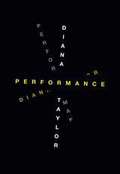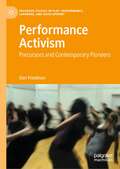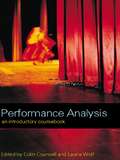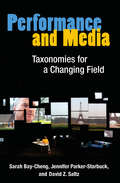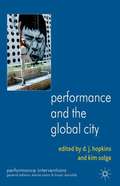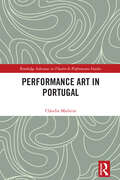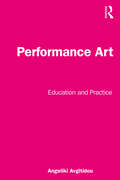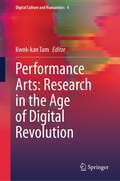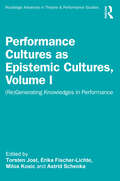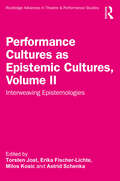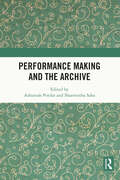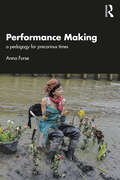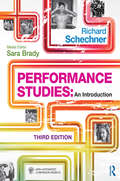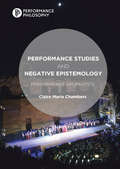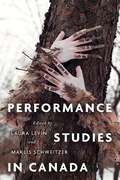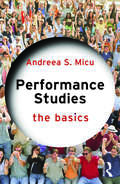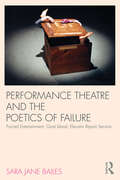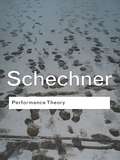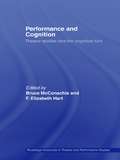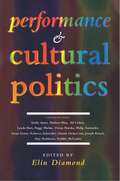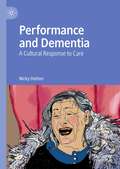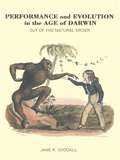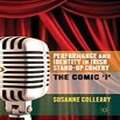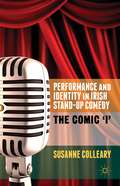- Table View
- List View
Performance
by Diana Taylor"Performance" has multiple and often overlapping meanings that signify a wide variety of social behaviors. In this invitation to reflect on the power of performance, Diana Taylor explores many of its uses and iterations: artistic, economic, sexual, political, and technological performance; the performance of everyday life; and the gendered, sexed, and racialized performance of bodies. This book performs its argument. Images and texts interact to show how performance is at once a creative act, a means to comprehend power, a method of transmitting memory and identity, and a way of understanding the world.
Performance Activism: Precursors and Contemporary Pioneers (Palgrave Studies In Play, Performance, Learning, and Development)
by Dan FriedmanThis is the first book length study of performance activism. While Performance Studies recognizes the universality of human performance in daily life, what is specifically under investigation here is performance as an activity intentionally entered into as a means of engaging social issues and conflicts, that is, as an ensemble activity by which we re-construct/transform social reality. Performance Activism: Precursors and Contemporary Pioneers provides a global overview of the growing interface of performance with education, therapy, conflict resolution, civic engagement, community development and social justice activism. It combines an historical study of the processes by which, over the course of the 20th Century, performance has been loosened from the institutional constraints of the theatre with a mosaic-like overview of the diverse work/play of contemporary performance activists around the world. Performance Activism will be of interest to theatre and cultural historians, performance practitioners and researchers, psychologists and sociologists, educators and youth workers, community organizers and political activists.
Performance Analysis: An Introductory Coursebook
by Laurie Wolf Colin CounsellThis revolutionary introductory performance studies coursebook brings together classic texts in critical theory and shows how these texts can be used in the analysis of performance. The editors put their texts to work in examining such key topics as: * decoding the sign * the politics of performance * the politics of gender and sexual identity * performing ethnicity * the performing body * the space of performance * audience and spectatorship * the borders of performance. Each reading is clearly introduced, making often complex critical texts accessible at an introductory level and immediately applicavble to the field of performance. The ideas explored within these readings are further clarified through innovative, carefully tested exercises and activities.
Performance And Media: Taxonomies For A Changing Field
by David Z. Saltz Sarah Bay-Cheng Jennifer Parker-StarbuckThis timely collaboration by three prominent scholars of media-based performance presents a new model for understanding and analyzing theater and performance created and experienced where time-based, live events, and mediated technologies converge-particularly those works conceived and performed explicitly within the context of contemporary digital culture. Performance and Media introduces readers to the complexity of new media-based performances and how best to understand and contextualize the work. Each author presents a different model for how best to approach this work, while inviting readers to develop their own critical frameworks, i. e. , taxonomies, to analyze both past and emerging performances. Performance and Media capitalizes on the advantages of digital media and online collaborations, while simultaneously creating a responsive and integrated resource for research, scholarship, and teaching. Unlike other monographs or edited collections, this book presents the concept of multiple taxonomies as a model for criticism in a dynamic and rapidly changing field.
Performance And The Global City
by Kim Solga D. J. HopkinsFollowing the ground-breaking Performance and the City, this volume, now available in paperback, explores what it means to create and experience urban performance - as both an aesthetic and a political practice - in the burgeoning world cities built by globalization and neoliberal capital. Featuring work by artists as well as scholars, written from multiple disciplinary perspectives, and including dozens of photographs as well as a photo essay by Nicholas Whybrow, Performance and the Global City will appeal to readers interested in urban studies, theatre and performance, geography, sociology, and globalization studies.
Performance Art in Portugal (Routledge Advances in Theatre & Performance Studies)
by Cláudia MadeiraThis book explores histories which have only recently been rediscovered by artists and researchers. This study explores the history of Portuguese performance art, in its various "speculative" and "performative" forms. The author approaches this relationship with the re-emergence and centrality of these (semi-)peripheral histories at an international level, whilst identifying some of their unique traits: their cycles of emergence and retraction in Portuguese history; their multiple and complex ontologies; the intertwined relations between the art of performance and the social performance of the Portuguese (regarding topics as sensitive and fracturing as those of the long dictatorship, the colonial war and the revolutionary process, or even the integration of Portugal in the European Community and, more recently, the various 21st century social, political and economic crises). This reading in turn covers the development of the relationship between performance and hybridism, namely, analyzing the recent dimension of meta-hybridism, in the processes of artistic homage that contemporary Portuguese creators have been establishing through access to the histories and archives of this historical genre. This book will be of great interest to students and scholars in theatre and performance studies, performance art and arts in general.
Performance Art: Education and Practice
by Angeliki AvgitidouPerformance Art: Education and Practice is an introduction to performance art through activities and practice prompts that are framed by seminal moments in the history of the medium as well as the current theoretical discussions surrounding performance. The book begins by introducing the terminology related to performance art and its early history. The basic elements of performance, including the body, objects, space, the public, and the public sphere are approached through thematic and conceptual correlations such as objects as autobiography, body as an expression of gendered identity, performance and the everyday, the augmented body, the archive of performance, and public space as space for intervention. Case studies analysed in each chapter are accompanied by reflective questions and discussion topics. The book proposes a wide range of exercises and comprehensive practice prompts that aim to enhance performance skills, promote experimentation, and encourage an experiential understanding of the theory, history, and concepts relating to performance art. Performance Art: Education and Practice is addressed to students of Fine Arts and Performance Studies from beginner to intermediate level, performance and visual artists who are interested in expanding their knowledge base and creative range, and artist-teachers who are interested in developing their own curriculum and workshop content.
Performance Arts: Research in the Age of Digital Revolution (Digital Culture and Humanities #4)
by Kwok-Kan TamThis volume reshapes a contemporary understanding of research in theatre and performance arts. Bringing together distinguished scholars from all over the world, the book serves as an arena for international scholars to introduce innovative research methodologies and disseminate their research findings regarding VLT, data archiving, and digital history and discusses the impacts of digital culture in art production, stage performance, film, and literature. The Ibsen focus in the book is illustrative of the power of digital database research that is generating new relations in spatial-historical dimensions that have otherwise gone unnoticed. It demonstrates how a new methodology can bring practical benefits to handling big data with the support of digital technologies. In line with the post-pandemic landscape, this book engages a reflection on how the digital revolution has brought about changes and challenges, and constraints and breakthroughs within the field of theatre and performance arts. It is of appeal to theatre artists and practitioners, scholars, critics, librarians, digital archive engineers, and postgraduate students interested in theatre, performance studies, digital media, information technology, library science, communication, education, sociology, as well as political science. “The book investigates the latest methodological development in digital cultures and performance arts, which significantly contributes to the ever-changing and increasingly advanced technological culture in this field.” - Jessica Tsui-yan Li, York University, Canada"In line with the post-pandemic landscape, this book engages the reader in reflecting on how the digital revolution has brought about chances and challenges, constraints and breakthroughs to the field of theatre and performance arts. An original, eye-opening and inspiring volume at multiple levels, this book brings together distinguished scholars from all over the world." - Dr Anna Tso, The Hang Seng University of Hong Kong
Performance Cultures as Epistemic Cultures, Volume I: (Re)Generating Knowledges in Performance (Routledge Advances in Theatre & Performance Studies)
by Torsten Jost, Erika Fischer-Lichte, Milos Kosic and Astrid SchenkaThis volume investigates performances as situated "machineries of knowing" (Karin Knorr Cetina), exploring them as relational processes for, in and with which performers as well as spectators actively (re)generate diverse practices of knowing, knowledges and epistemologies. Performance cultures are distinct but interconnected environments of knowledge practice. Their characteristic features depend not least on historical as well as contemporary practices and processes of interweaving performance cultures. The book presents case studies from diverse locations around the globe, including Argentina, Canada, China, Greece, India, Poland, Singapore, and the United States. Authored by leading scholars in theater, performance and dance studies, its chapters probe not only what kinds of knowledges are (re)generated in performances, for example cultural, social, aesthetic and/or spiritual knowledges; the contributions investigate also how performers and spectators practice knowing (and not-knowing) in performances, paying particular attention to practices and processes of interweaving performance cultures and the ways in which they contribute to shaping performances as dynamic "machineries of knowing" today. Ideal for researchers, students and practitioners of theater, performance and dance, (Re)Generating Knowledges in Performance explores vital knowledge-serving functions of performance, investigating and emphasizing in particular the impact and potential of practices and processes of interweaving of performance cultures that enable performers and spectators to (re)generate crucial knowledges in increasingly diverse ways.
Performance Cultures as Epistemic Cultures, Volume II: Interweaving Epistemologies (Routledge Advances in Theatre & Performance Studies)
by Torsten Jost, Erika Fischer-Lichte, Milos Kosic and Astrid SchenkaThis volume investigates performance cultures as rich and dynamic environments of knowledge practice through which distinctive epistemologies are continuously (re)generated, cultivated and celebrated. Epistemologies are dynamic formations of rules, tools and procedures not only for understanding but also for doing knowledges. This volume deals in particular with epistemological challenges posed by practices and processes of interweaving performance cultures. These challenges arise in artistic and academic contexts because of hierarchies between epistemologies. European colonialism worked determinedly, violently and often with devastating effects on instituting and sustaining a hegemony of modern Euro-American rules of knowing in many parts of the world. Therefore, Interweaving Epistemologies critically interrogates the (im)possibilities of interweaving epistemologies in artistic and academic contexts today. Writing from diverse geographical locations and knowledge cultures, the book’s contributors—philosophers and political scientists as well as practitioners and scholars of theater, performance and dance—investigate prevailing forms of epistemic ignorance and violence. They introduce key concepts and theories that enable critique of unequal power relations between epistemologies. Moreover, contributions explore historical cases of interweaving epistemologies and examine innovative present-day methods of working across and through epistemological divides in nonhegemonic, sustainable, creative and critical ways. Ideal for practitioners, students and researchers of theater, performance and dance, Interweaving Epistemologies emphasizes the urgent need to acknowledge, study and promote epistemological plurality and diversity in practices of performance-making as well as in scholarship on theater and performance around the globe today.
Performance Making and the Archive
by Sharmistha Saha Ashutosh PotdarThis book investigates theories and practices shaped by a performance’s relationship to the archive. The contributions in the volume examine how the changing nature of performance practices has made it imperative to understand how the archive and archival practices could add to the performance work. They explore a variety of themes, including artistic engagement with the archive in both conceptual and material terms; physical, virtual and digital forms; publicly and privately collected; oral, written and digital ways; or organized and unorganized collections. Finally, the volume examines how archives are modelled on existing structure and the ways in which they can be brought into discourses and practices of performance making through engagement and contestation. A novel approach to performance theory, this volume will be of great interest to scholars and researchers of performance studies, media and culture studies, studies of technology and art as also literature and literary criticism.
Performance Making: a pedagogy for precarious times
by Anna FurseSurveying how Performance as a form has evolved as a distinct artistic sector to where it is today, Performance Making: a pedagogy for precarious times provides insight into the impact the artform has had across the creative sector and argues for its defence in higher education today.Drawing on over 40+ years’ worth of experience as artist and academic, Anna Furse interrogates the ways in which the practice of Performance is truly interdisciplinary, offering a specific creative and critical practice approach. Chapters address the neo-liberal turn and its effect on culture; the history of the emergence of the genre within Performance Studies; the underlying political and cultural message of Performance as independent and necessary; wider philosophical and critical theoretical thinking that can support innovation within the field; and the key principles in the creation of live work such as space, site, scenography, the body, collaboration, and composition. Each chapter includes an essay, case studies, and exercises, empowering students to apply critical thinking to their own work.Focusing on developing creative-critical methodologies in Performance Making at postgraduate level for international cohorts, this textbook will equip students, instructors, and practitioners to contextualise and enrich their Performance practice and leadership.
Performance Studies
by Richard SchechnerThe publication of Performance Studies: An Introduction was a defining moment for the field. Richard Schechner's pioneering textbook provides a lively and accessible overview of the full range of performance for undergraduates at all levels and beginning graduate students in performance studies, theatre, performing arts, and cultural studies. Among the topics discussed are the performing arts and popular entertainments, rituals, play and games, and the performances of everyday life. Supporting examples and ideas are drawn from the social sciences, performing arts, poststructuralism, ritual theory, ethology, philosophy, and aesthetics. This third edition is accompanied by an all-new companion website curated by a dedicated media editor, with the following resources for instructors and students: Interactive glossary Multiple choice questions Powerpoint Slides. Videos Website links for further study Tutorials on specific skills within Performance Studies Sample Discussion Questions Exercises and Activities Sample Syllabi The book itself has also been revised, with 25 new extracts and biographies, up-to-date coverage of global and intercultural performances, and further exploration of the growing international presence of Performance Studies as a discipline. Performance Studies is the definitive overview for undergraduates, with primary extracts, student activities, key biographies and over 200 images of global performance.
Performance Studies and Negative Epistemology
by Claire Maria ChambersThis book argues that apophaticism continues to exert strong influence in Western cultural discourses, especially performance. While apophaticism in the academy may have had its heyday in the debates about negative theology and deconstruction in the 1990s, negative knowledges have continued to influence theatre and performance studies around issues of embodiment, the non- and post-human, objects, archives, the ethics of otherness, and the inaccessible in the work of minority artists. Part of the history of apophaticism lies in mystic literature; with the rise of the New Age movement, which claimed historical mysticism as its predecessor, apophaticism has often been sidelined as spirituality rather than serious study. By reassessing ancient forms of negative epistemology, this book suggests that artists, scholars, students and teachers alike can more deeply engage forms of unknowing through what cannot be spoken and cannot be represented, both on the stage and in every aspect of social life.
Performance Studies in Canada
by Laura Levin and Marlis SchweitzerTracing performance studies paths in Canada.
Performance Studies: The Basics (The Basics)
by Andreea S. MicuPerformance Studies: The Basics offers an overview of the multiple, often overlapping definitions of performance, from performance art, performance as everyday life, and rituals, to the performative dimensions of identity, such as gender, race and sexuality. This book defines the interdisciplinary field of performance studies as it has evolved over the past four decades at the intersection of academic scholarship and artistic and activist practices. It discusses performance as an important means of communicating and of understanding the world, highlighting its intersections with critical theory and arguing for the importance of performance in the study of human behaviour and social practices. Complete with a helpful glossary and bibliography, as well as suggestions for further reading, this book is an ideal starting point for those studying performance studies as well as for general readers with an interest in the subject.
Performance Theatre and the Poetics of Failure
by Sara Jane BailesWhat does it mean to "fail" in performance? How might staging failure reveal theatre’s potential to expand our understanding of social, political and everyday reality? What can we learn from performances that expose and then celebrate their ability to fail? In Performance Theatre and the Poetics of Failure, Sara Jane Bailes begins with Samuel Beckett and considers failure in performance as a hopeful strategy. She examines the work of internationally acclaimed UK and US experimental theatre companies Forced Entertainment, Goat Island and Elevator Repair Service, addressing accepted narratives about artistic and cultural value in contemporary theatre-making. Her discussion draws on examples where misfire, the accidental and the intentionally amateur challenge our perception of skill and virtuosity in such diverse modes of performance as slapstick and punk. Detailed rehearsal and performance analysis are used to engage theory and contextualise practice, extending the dialogue between theatre arts, live art and postmodern dance. The result is a critical account of performance theatre that offers essential reading for practitioners, scholars and students of Performance, Theatre and Dance Studies.
Performance Theory
by Richard SchechnerFew have had quite as much impact in both the academy and in the world of theatre production as Richard Schechner. For more than four decades his work has challenged conventional definitions of theatre, ritual and performance. When this seminal collection first appeared, Schechner's approach was not only novel, it was revolutionary: drama is not just something that occurs on stage, but something that happens in everyday life, full of meaning, and on many different levels. Within these pages he examines the connections between Western and non-Western cultures, theatre and dance, anthropology, ritual, performance in everyday life, rites of passage, play, psychotherapy and shamanism.
Performance and Cognition: Theatre Studies and the Cognitive Turn (Routledge Advances in Theatre & Performance Studies)
by Bruce McConachie F. Elizabeth HartThis anthology is the first of its kind. In addition to opening up fresh perspectives on theatre studies – with applications for dramatic criticism, performance analysis, acting practice, audience response, theatre history, and other important areas – the book sets the agenda for future work, helping to map the emergence of this new approach. Following a comprehensive introduction, the contributors examine: the interfaces between cognitive studies and Lacanian psychoanalysis, phenomenology and communication theory different ideas from cognitive studies that open up the meanings of several plays the process of acting and the work of Antonio Damasio theatrical response: the dynamics of perception, and the riots that greeted the 1907 production of The Playboy of the Western World. This original and authoritative work will be attractive to scholars and graduate students of drama, theatre, and performance.
Performance and Cultural Politics
by Elin DiamondPerformance and Cultural Politics is a groundbreaking collection of essays which explore the historical and cultural territories of performance, written by the foremost scholars in the field. The essays, exploring performance art, theatre, music and dance, range from Oscar Wilde to Eric Clapton; from the Rose Theatre to U.S. Holocaust museums. The topic includes: * Sex Play: Stereotype, Pose and Dildo * Grave Performances: The Cultural Politics of Memory * Genealogies: Critical Performances * Identity Politics: Passing, Carnival and the Law In the concluding section, `Performer's Performance', performance artist Robbie McCauley offers the practitioner's perspective on performance studies. Interdisciplinary, thought-provoking and rich in new ideas, Performance and Cultural Politics is a landmark in the emerging field of performance studies.
Performance and Dementia: A Cultural Response to Care
by Nicky HattonThis book explores how theatre and performance can change the way we think about dementia and some of the environments in which dementia care takes place. Drawing on the author’s creative practice and other performance projects in the UK, it explores some of the challenges and opportunities of making performance in care homes. Rather than focusing on the transformative potential of the arts, it asks how artists can engage with the different types of relationships that exist in a care community. These include the relationships that residents and staff have with each other as well as relationships with care spaces. Exploring the intersection between participatory performance and the everyday creativity of a care home, it argues that the arts have a cultural role to play in supporting dementia care as a relational practice. Moreover, it celebrates the intrinsic creativity of caregiving and how principles and practices of care work can inform theatre and performance in diverse ways.
Performance and Evolution in the Age of Darwin: Out of the Natural Order
by Jane GoodallPerformance and Evolution in the Age of Darwin reveals the ways in which the major themes of evolution were taken up in the performing arts during Darwin's adult lifetime and in the generation after his death. The period 1830-1900 was the formative period for evolutionary ideas. While scientists and theorists investigated the law and order of nature, show business was more concerned with what was out of the natural order. Missing links and throwbacks, freak taxonomies and exotic races were favourite subject matter for the burgeoning variety theatre movement. Focusing on popular theatre forms in London, New York and Paris, Jane Goodall shows how they were interwoven with the developing debate about human evolution. With this book, Goodall contributes an important new angle to the debates surrounding the history of evolution. She reveals that, far from creating widespread culture shock, Darwinian theory tapped into some of the long-standing themes of popular performance and was a source for diverse and sometimes hilarious explorations.
Performance and Identity in Irish Stand-Up Comedy
by Susanne CollearyPerformance and Identity in Irish Stand-Up Comedy examines the comic tradition of stand-up in and from modern-day Ireland. Using critical analyses of comedians including Tommy Tiernan, Dylan Moran and Maeve Higgins, Susanne Colleary's engaging new book explores the role of stand-up in contemporary culture and examines the role of the staged comic self in performance. This book is suitable for students and scholars of international performance, and general readers interested in the interplay between comedy and society in contemporary cultural thought.
Performance and Identity in Irish Stand-Up Comedy: The Comic 'i'
by S. CollearyOne of the cultural phenomena to occur in Ireland in the last two decades has been the highly successful growth of stand-up comedy as a popular entertainment genre. This book examines stand-up comedy from the perspective of the narrated self, through the prism of the fabricated comedy persona, including Tommy Tiernan, Dylan Moran and Maeve Higgins.
Performance and Identity in the Classical World
by Anne DuncanActors in the classical world were often viewed as frauds and impostors, capable of deliberately fabricating their identities. Conversely, they were sometimes viewed as possessed by the characters that they played, or as merely playing themselves onstage. Numerous sources reveal an uneasy fascination with actors and acting, from the writings of elite intellectuals (philosophers, orators, biographers, historians) to the abundant theatrical anecdotes that can be read as a body of "popular performance theory. " This study examines these sources, along with dramatic texts and addresses the issue of impersonation, from the late fifth century BCE to the early Roman Empire.
